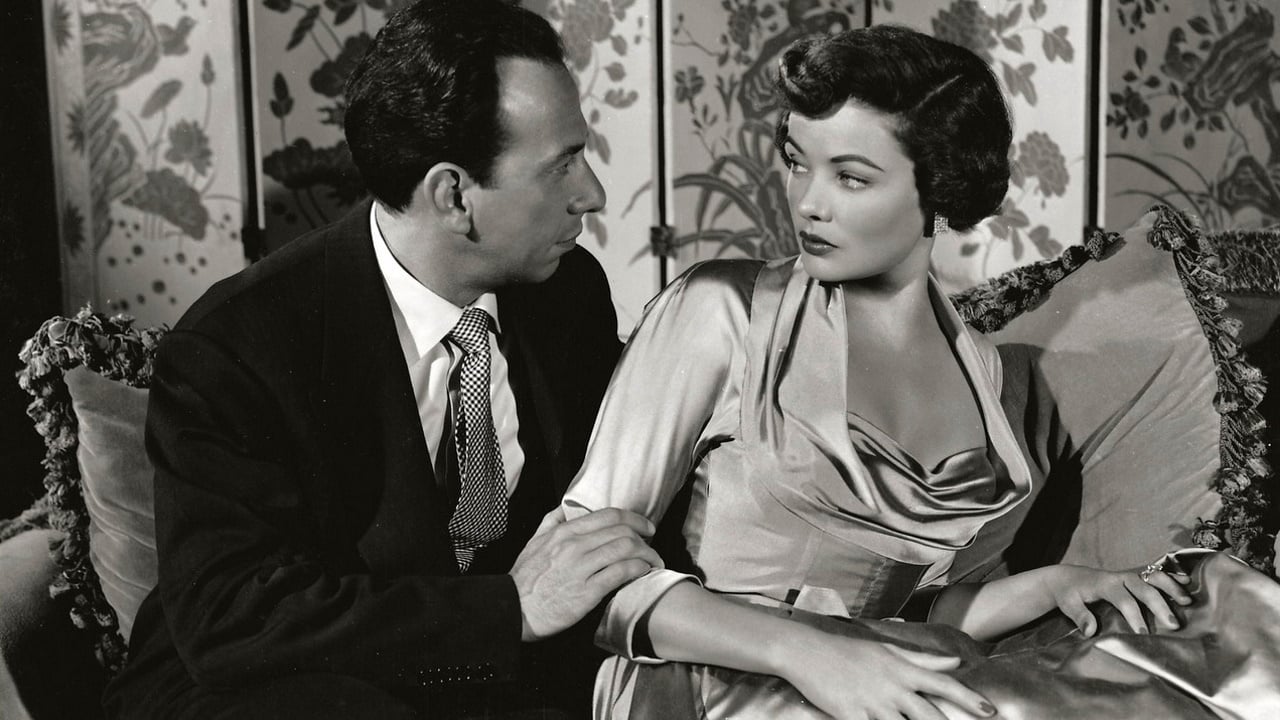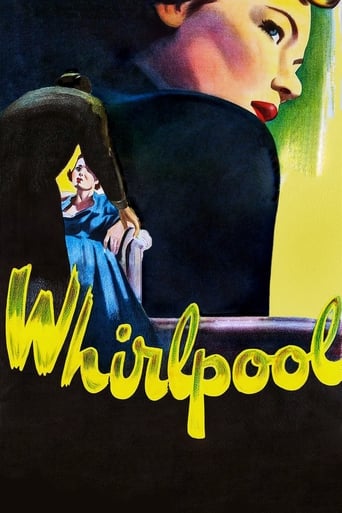

Great first two thirds with fine performances by the leads, let down badly by an ending that is highly implausible, sits at odds with the tone of the rest of the movie and isn't really delivered well - pity
... View MoreOh sure, Ann Sutton could pay for that pin - or for many other things - but there's something, probably, about the thrill of taking something, very non-chalant out of a store, especially as an unsuspecting adult white woman in the late 40's, and not getting caught. Is it Kleptomania? Perhaps. But the point is, at the start of Whirlpool, Ann gets caught at a department store stealing a pin, and she's in luck that David Korvo is there to help excuse her away - these are false charges after all, she has the money to buy a dozen of these pins, right - but there's a catch to her being let go: not so much for money, at least it seems at first. She tries to pay him, but for five thousand, p-shaw. No, he wants to get at her mind, to find what it is that made her do this thing... but it will lead to murder.Gene Tierney and Jose Ferrer play Ann and Korvo, and they're both excellent here. Even a one and a half note character (not quite one, maybe, almost two dimensional, if it tried) like Ann's husband Bill gets a solid performance out of Richard Conte, to the point where we really feel for their marriage, and see the conflict very plain as soon as Ann 'turns' on to her 'nothing's the matter' tone of voice to her husband after she comes home and tells the maid that there's something very wrong and she must speak to her husband soon as he gets home. Is she crazy? Has she been driven mad? She's no femme fatale really - she is in what seems to be a fairly happy marriage (though at one critical point she'll say otherwise in a very tense confessional). But she is flawed and interesting, and that helps.It's especially good that this character is so strong, as well as Korvo being an equally strong, conniving villain, and we know he's a villain from basically minute one but the fun is seeing how he does things like slip a glass with the lady's fingerprints into his jacket while she's away for a minute from the lunch table. But there's a couple of plot holes here that are jarring - one is more character-based and comes in the third act, it felt like a scene was missing that involved convincing a particular character to give Ann one more chance, and there was a connective tissue from the convincing to her not in prison - and I have to wonder how much they cut out of the book. It seems like a lot. Not to mention the notion of how completely tight the hypnosis can be, just how air-tight a plot can be (that we don't really see be suggested by the way) for Ann to go out in her car and get those records and then for that other thing to happen.Whirlpool isn't weak tea by any means, but I have to think Preminger, despite some clever camera angles and the usual flair for hardcore film noir as a director (the tension in that final scene is really terrific, especially how a character hides just until a certain moment) would have had some trouble without this cast. Thankfully, Tierney gives this character credibility and she makes her fragile, torn and frayed, and when she's in her hypnotic trances it's like she's walking on air. I even liked the one/two scene turn by Barbara O'Neil (Constance Collier also has some good lines). Not something to rush to see, but it's a fair follow-up for the director and star from Laura - more of a B-side if one were to screen them back to back
... View MoreHad I not already seen "Fear in the Night" (1947), I think I would have liked "Whirlpool" a bit more. But, the prior film was low-budget and handled a similar topic much better. In contrast, Otto Preminger was a big-name director and this was made by Twentieth-Century Fox--yet lacks the same emotional wallop as "Fear in the Night". Both films are about evil hypnotists who use their powers for evil and to cover up crimes. While this is all a lot of psychological mumbo-jumbo, it was fascinating. But what made the prior film better is its originality as well as how it surprised the viewer. That's because in the Preminger film, you see the evil hypnotist (Jose Ferrer) setting up the crime, so you know exactly who is responsible--and there is absolutely no mystery about this. In contrast, the other film only slowly reveals what has occurred--thinking the viewer guessing and making for a much higher level of suspense. Still, both are worth seeing...and both are dubious when it comes to showing the ridiculous things hypnosis supposedly can do (I have training in hypnosis and know it is a lot less magical than TV and movies would have you think).Gene Tierney is caught shoplifting at the beginning of the film. Despite her husband being a well to do psychiatrist, she's a thief...and the evil hypnotist catches her and uses this to gain influence over her. While he pretends to be there to treat her for her compulsion to steal, he actually is hypnotizing her into doing his bidding--much like Svengali from the story "Trilby". Eventually, using this evil hypnosis, Tierney is caught in the home of a woman who was just murdered--and it appeared she did it. This is only about midway through the film and unraveling this bizarre mystery takes up the second half of the movie.As another reviewer said, Charles Bickford did a very good job playing the detective investigating the case. The rest of the cast was just fine, though it is interesting that they chose Tierney to play a mentally unstable woman since in real life she had a long and significant history of mental illness. This was actually pretty brave of her to play such a tough role. It's well made and interesting as well...but not at all great or extraordinary. Decent, but that's all.
... View MoreAnn Sutton (Gene Tierney) is married to Dr. Bill Sutton, an upright psychoanalyst (played by a completely miscast Richard Conte). When we first meet Ann, she's getting arrested by a store detective in a department store after attempting to steal an expensive piece of jewelry. Okay, so that's a bit of a twistour heroine is a kleptomaniac. Next into the mix is the oily David Korvo (nicely and seedily played by Jose Ferrer). He knows the department store owner and convinces him to drop the charges against Ann.Korvo is 1949's answer to a new age practitioner: he dabbles in astrology but is principally a hypnotist. At first Ann believes Korvo is trying to blackmail her but he persuades her that he really wants to be her 'therapist'. Ann is smart enough to realize that Korvo is trying to get her to come up to his hotel room so they can have sex so she meets him downstairs in the hotel lobby. Korvo gives up on the sex idea but has more sinister plans. At first, he charges $50 for hypnotism sessions which appear to be helping Ann with her insomnia.We learn more about Korvo from one of Bill Sutton's patients, Theresa Randolph, who tries to warn Ann that Korvo is a blackmailer and up to no good but Ann believes that Theresa is merely jealous of her relationship with this extremely crafty Svengali (apparently Bill adheres to a strict code of doctor-patient confidentiality as Ann has never met Theresa Randolph before). Bill records his therapy sessions on new-fangled long playing records which he stores in a closet in his home. Everything about Korvo's 'modus operandi' (his penchant for blackmail and physical abuse) are detailed in these recordings and Korvo realizes that he has to get his hands on them if he is to continue in his career as a con artist.So what does Korvo do? He murders Randolph (just as she's about to change her will negating a bequest that leaves Korvo a large amount of money as part of her estate). He also hypnotizes Ann and has her steal the Randolph therapy session recordings and puts them in a closet in Randolph's house. He sets Ann up by leaving a glass with Ann's fingerprint on it in Randolph's home. The police arrive and arrest Ann for murder.Now it gets strange, real strange! Korvo needs an alibi. Apparently he's been having gall bladder problems so he arranges to have an operation at two in the afternoon on the day of the murder. The murder occurs at nine in the evening so how does Korvo pull it off? Well we find out (quite improbably) that Korvo hypnotized himself and was able to drag himself out of bed and commit the murder.The hypnotist's power of suggestion has a prominent role in this film but unfortunately much too prominent. I always believed that hypnotism might be a useful tool in helping people overcome minor health or psychological problems (such as Ann being helped with her insomnia at the beginning of the film). But I didn't buy it for a minute when Korvo orders Ann around in a trance and then hypnotizes himself hours after major surgery. And then Korvo does it againhe hypnotizes himself once more so he can leave the hospital and try and get his hands on the recordings. But instead of taking the recordings and getting out of the deceased Randolph's house right away (or even destroying them at the house), he tarries and begins playing them on the phonograph in the living room. This gives the Suttons and the investigating detective enough time to arrive at the crime scene where they eventually confront Korvo, who drops dead from blood loss (apparently his hypnotic suggestions are not powerful enough to stanch the bleedingcomplications from his surgery earlier that afternoon).Aside from the obvious plot holes, there is also a distasteful conceit being peddled by the film's screenwriters here. The dubious and subjective 'profession' of psychoanalysis not only is depicted as being highly 'scientific' but is also placed on par with practitioners in the medical profession. 'Unscientific', unlicensed 'healers' (represented by the evil Korvo) are presented as bogus and manipulative in striking contrast to the upright Dr. Sutton (who uses his psychobabble) to uncover the ROOT of his wife's kleptomania. With some kind soothing words, Dr. Sutton will soon solve his wife's neurosis and they can once again move amongst their social equals and bring good cheer to them without the fear of scandal.If you see this on DVD, there's some interesting commentary by film critic Richard Shickel. He notes that the late film critic, Pauline Kael, termed this film "a real stinker". But Schikel is more on the side of critic Andrew Sarris who felt there were a lot of worthwhile things about the film. While Tierney and Ferrer's performances draw you in, the plot holes and the psychobabble are enough to keep one from taking the DVD off the shelf and watching it every couple of months. I'm not sure if 'Whirlpool' deserves to be called a 'real stinker' but it's decidedly no great work of art!
... View More